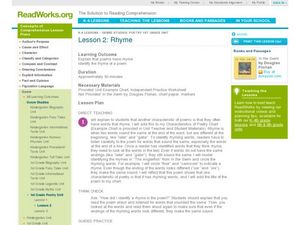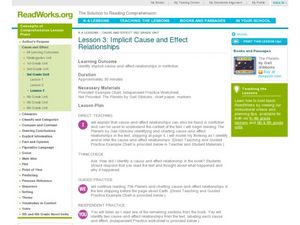Curated OER
The Structure of Poems
First graders listen to and view the structure of various insect poems. In this structure of poems lesson, 1st graders compare to other text they have read. Students complete a vocabulary exercise about the word bold. Students will...
Curated OER
Rhyme
First graders explore rhyme through the use of poems. In this language arts lesson plan, 1st graders read poems and identify words that rhyme within the poem. Students circle the rhyming words within a poem as they listen.
Curated OER
Reasonable Predictions
First graders discuss reasonable predictions for the outcome of stories. In this language arts instructional activity, 1st graders discuss that good readers predict what will happen next in a story. Students read the given text and make...
Curated OER
Sequence Clue Words (Part 1)
Does your class know they can use sequence words such as, next, finally, after, and then to better understand the sequence of a story? First they discuss sequential order and sequence words, then they look for sequence words as they read...
Curated OER
Sequence Clue Words (part 2)
If you've already discussed using sequence words to determine the sequence of events in a story, then a follow up lesson plan is definitely in order. They read the story, My Apron by Eric Carle and look at the sequence clue words such as...
Curated OER
To Entertain
Second graders consider the author's purpose for writing a text. In this author's purpose lesson plan, 2nd graders discuss reasons why author's write a book and how it can often be for entertainment. Students read a book, provide two...
Curated OER
Causes
What makes someone cry? Little learners read the story, Why Do You Cry?: Not a Sob Story by Kate Klise to discover a bit about crying and a bit about cause and effect. They'll fill out a cause and effect chart while they discuss and...
Curated OER
Sorting in More than One Way
Sorting, categorizing, and classifying are skills learners must master for many different reasons. The class will work in small groups to list, classify, and sort a stack of familiar books. The neat part about the lesson plan is that the...
Curated OER
Lesson 1: Explicit Information versus drawing conclusions
Second graders look at the difference between explicit information and drawing conclusions. In this drawing conclusions lesson, 2nd graders read a passage and find areas where information is given and others where they have to think to...
Curated OER
Lesson 4: Text-to-World Connections
Making connections to the text you're reading may help build a deeper appreciation and understanding of the material. Second graders practice making text to self and text to life connections as they read two passages; one about Martin...
Curated OER
Explicit Information in Fiction
Second graders analyze the use of explicit information in fictional texts. In this language arts lesson, 2nd graders read a story and use the text to answer questions.
Curated OER
Lesson 2: Distinguish Fact from Opinion in Books
An important part of reading informational text is being able to discern fact from opinion. The class reads chapter one from the book, Penguins by Lynn M. Stone. They analyze specific sections of the text to determine if what is being...
Curated OER
Lesson 1: Figurative Language
The story Once in a Blue Moon by Nicola Morgan is full of figurative language. Second graders choose one idiom from the story and create an illustration of its meaning. Handouts and structured vocabulary practice is included with the...
Curated OER
Personification
Second graders recognize personification in texts. In this personification lesson plan, 2nd graders discuss figurative language and how characters can be given human-like qualities. Students read a story and write down examples they...
Curated OER
Using Chapter Titles to Determine the Main Idea
Second graders listen to the passage titled Pumpkin Picking and identify the main idea based on the title. In this main idea lesson plan, 2nd graders discuss how the title of a book or chapter sets the tone for the reading.
Curated OER
Creating a Chapter Title
Second graders identify the main idea of a selection of text. In this creating a chapter title instructional activity, 2nd graders discuss how to find the main idea of a chapter, listen to a chapter read aloud, and create a title with...
Curated OER
Lesson 3: Predicting Beyond the Text
Second graders make predictions beyond the text. In this prediction lesson, 2nd graders read a story and predict what happens to the characters after the story is over by using evidence from what they read. They read three different...
Curated OER
Retell a Story in Sequential Order
Second graders discuss sequential order. In this language arts lesson, 2nd graders practice retelling a story in sequential order. Students read a story and chart the events in sequential order.
Curated OER
Flashback Sequence
Second graders practice recalling the sequence of events in a story. In this sequencing lesson, 2nd graders listen to the story, A Chair for My Mother and identify each flashback that occurs in the text. Students chart the sequence of...
Curated OER
Changing Setting in a Story
Second graders explore how the setting in a story changes throughout. In this language arts instructional activity, 2nd graders read a story and identify the setting at various points within the story. Students describe the changes in...
Curated OER
Glossary
Show your class how they can use a glossary to determine the meaning of an unfamiliar word. A book about the great emperor penguin is used to hone in on vocabulary development through the use of context clues and the glossary found at...
Curated OER
Lesson 1: Identifying an Author's Purpose
Different types of text are written for very different reasons. Learners discuss the differences in writing to entertain, to inform, and to persuade their audiences. They work on identifying the author's purpose by reading and charting...
Curated OER
Lesson 1:Cause and Effect Signal Words
Give your class a strategy they can use when trying to identify cause and effect relationships in text. You'll model, and they'll practice using signal words to quickly identify cause and effect. They focus on signal words such as, if,...
Curated OER
Implicit Cause and Effect Relationships
Cause and effect relationships can be found in both fiction and non-fiction texts. As they read the book, The Planets by Gail Gibbons, learners keep an eye out for cause and effect relationships. They chart all of the causes and effects...

























